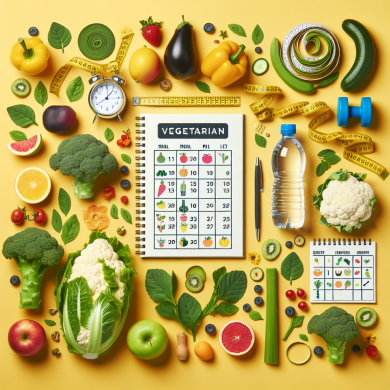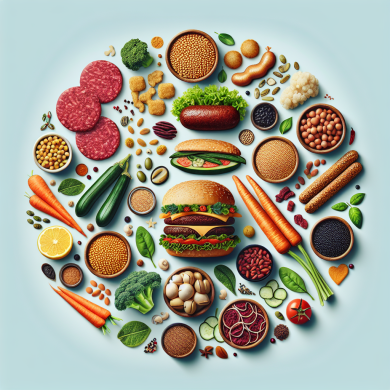Seamless Shift: Adopting a Vegetarian Lifestyle
Introduction to Vegetarianism
The decision to adopt a vegetarian lifestyle is often driven by a multitude of factors including health benefits, ethical considerations, environmental concerns, and cultural or religious beliefs. Vegetarianism, which involves abstaining from consuming meat, poultry, and fish, has gained popularity worldwide as people become more aware of the benefits associated with plant-based diets. This article aims to provide a comprehensive guide for those considering a seamless transition to a vegetarian lifestyle, exploring the benefits, challenges, and practical steps involved.
The Benefits of a Vegetarian Lifestyle
Switching to a vegetarian diet can offer numerous health benefits. Studies have shown that vegetarians often have lower risks of heart disease, hypertension, type 2 diabetes, and certain types of cancer. This is largely attributed to the high intake of fruits, vegetables, whole grains, and legumes, which are rich in essential nutrients and antioxidants. Additionally, vegetarian diets are generally lower in saturated fats and cholesterol.
From an ethical standpoint, many individuals choose vegetarianism to reduce animal suffering and promote animal rights. The industrial farming of animals raises concerns about animal welfare and the humane treatment of livestock. By adopting a vegetarian lifestyle, individuals can align their dietary choices with their ethical beliefs.
Environmental sustainability is another compelling reason to adopt a vegetarian lifestyle. The production of meat and dairy is resource-intensive, requiring significant amounts of water, land, and energy. By reducing meat consumption, individuals can decrease their carbon footprint and contribute to the preservation of natural resources.
Types of Vegetarian Diets
Before transitioning to a vegetarian lifestyle, it is essential to understand the different types of vegetarian diets:
– **Lacto-ovo vegetarian**: Includes dairy products and eggs but excludes meat, poultry, and fish.
– **Lacto vegetarian**: Includes dairy products but excludes eggs, meat, poultry, and fish.
– **Ovo vegetarian**: Includes eggs but excludes dairy products, meat, poultry, and fish.
– **Vegan**: Excludes all animal products, including dairy, eggs, and honey.
Each type of vegetarian diet offers unique benefits and challenges, and individuals should choose the one that aligns best with their dietary preferences and ethical beliefs.
Practical Steps for a Seamless Transition
1. Educate Yourself
Understanding the nutritional needs of a vegetarian diet is crucial for a successful transition. Educate yourself about essential nutrients such as protein, iron, calcium, vitamin B12, and omega-3 fatty acids, and learn how to incorporate these into your diet through plant-based sources. Books, online resources, and consultations with a registered dietitian can provide valuable insights.
2. Start Gradually
For many, the thought of eliminating meat entirely from their diet can be daunting. To make the transition smoother, consider starting gradually by incorporating more plant-based meals into your weekly routine. Begin with “Meatless Mondays” and gradually increase the number of vegetarian meals you consume each week.
3. Explore New Foods
One of the joys of adopting a vegetarian lifestyle is discovering new and exciting foods. Explore different cuisines that naturally emphasize plant-based dishes, such as Indian, Mediterranean, and Middle Eastern. Experiment with a variety of fruits, vegetables, grains, legumes, nuts, and seeds to diversify your diet and prevent monotony.
4. Plan Balanced Meals
Ensuring that your meals are balanced and nutritionally adequate is vital. Aim to include a source of protein, healthy fats, whole grains, and a variety of fruits and vegetables in each meal. Legumes, tofu, tempeh, quinoa, and lentils are excellent protein sources for vegetarians.
5. Be Mindful of Nutrient Intake
While a vegetarian diet can be nutritionally adequate, certain nutrients may require special attention. Vitamin B12, primarily found in animal products, is a common concern for vegetarians. Consider fortified foods or supplements to meet your B12 needs. Similarly, ensure you’re getting enough iron and calcium by including foods like leafy greens, fortified plant milks, and nuts in your diet.
6. Build a Support System
Having a support system can make a significant difference in your transition to a vegetarian lifestyle. Connect with friends, family, or online communities who are also interested in vegetarianism. Sharing experiences, recipes, and tips can provide encouragement and motivation.
Overcoming Challenges
Social Situations
Navigating social situations, such as dining out or attending gatherings, can be challenging for new vegetarians. Researching restaurant menus in advance, suggesting vegetarian-friendly venues, or offering to bring a vegetarian dish to gatherings can help ease these situations. Clear communication with friends and family about your dietary choices is also important.
Cravings and Temptations
Experiencing cravings for familiar non-vegetarian foods is common, especially in the early stages of transitioning. Address these cravings by finding vegetarian alternatives that mimic the texture and flavors of meat, such as plant-based burgers, sausages, and dairy substitutes.
Maintaining Nutritional Balance
Ensuring nutritional balance is a primary concern for vegetarians. Regularly monitor your nutrient intake and consider periodic blood tests to ensure you’re meeting your nutritional needs. Consulting a healthcare professional or dietitian can provide personalized guidance and support.
Conclusion
Adopting a vegetarian lifestyle is a personal journey that offers numerous health, ethical, and environmental benefits. By educating yourself, planning balanced meals, and gradually transitioning, you can make the shift seamless and sustainable. Embrace the opportunity to explore new foods and connect with a supportive community as you embark on this fulfilling path. Whether motivated by health, ethics, or sustainability, the choice to adopt a vegetarian lifestyle can be a rewarding and transformative experience.















Add comment